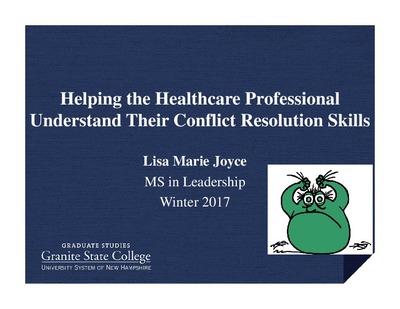Helping the Healthcare Professional Understand Their Conflict Resolution Skills
Helping the Healthcare Professional Understand Their Conflict Resolution Skills
| dc.contributor.author | Joyce, Lisa | |
| dc.date.accessioned | 2022-01-05T14:36:56Z | |
| dc.date.available | 2022-01-05T14:36:56Z | |
| dc.date.semester | Winter 2017 | |
| dc.identifier.uri | https://archives.granite.edu/handle/20.500.12975/412 | |
| dc.description | Conflict is feared due to the unknown variables. In healthcare, negative conflict can interfere with patient care, team motivation and professional relationships. Using the Thomas-Kilman Conflict Mode Instrument, a group of medical professionals were questioned about their conflict resolution styles. Surprisingly, most of the participants-including managers and providers, scored in the Avoiding conflict description. Continued avoidance of conflict can impact the stress level of staff resulting in a negative atmosphere and ultimately in quality of patient care. By understanding the emotional side of conflict and building skills of active listening, self-awareness and mindful communication, conflict resolution can become a positive experience. These positive changes can improve the culture of the organization and keep patients engaged and informed in their care. | |
| dc.title | Helping the Healthcare Professional Understand Their Conflict Resolution Skills | |
| dc.title | Helping the Healthcare Professional Understand Their Conflict Resolution Skills |

